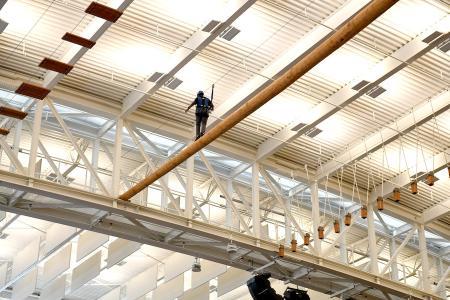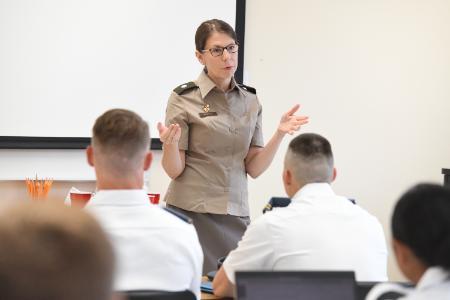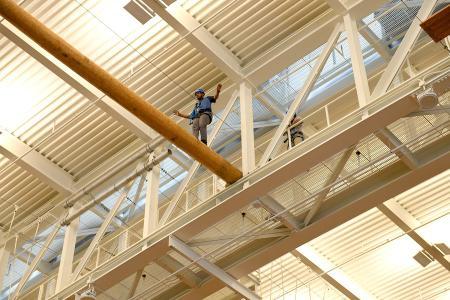New VMI Psych Class Studies Risk in Youth
LEXINGTON, Va. Dec. 8, 2023 — Lt. Col. Sara Whipple, associate professor of psychology at Virginia Military Institute, developed a new class this semester titled, “Risk and Resilience in Youth.” Cadets taking the course study risk factors that youth can face, and how those risks manifest in the physical body, particularly the brain. Cadets also learn to identify conditions that safeguard against risk, and examine programs and policies that focus on positive youth development.
According to Whipple, one such program is the College Orientation Workshop, Inc. (COW), a challenging four-week summer program that offers education, leadership, character building, and physical training to promising male minority high school students at no cost to them. The program also encourages and helps prepare the students to seek higher education at the college of their choice. “COW is a superb example of a multi-faceted intervention program. They have 37 years of experience working with young men. As a result, they understand the types of risks these young men have faced at home, school, and in their neighborhoods. They also have first-hand insight into what works, as evidenced by the success of many of the COW graduates,” said Whipple.
Whipple invited Eugene Williams ’74, founder and executive director of COW, and Capt. Chad Joyce, instructor in the Department of Human Performance and Wellness at VMI and director of COW, to speak to her class recently. Williams opened his talk by asking the cadets several probing questions: “What comes to mind when you hear the term ‘at risk youth’? Who do you see in your mind’s eye?” After hearing many answers, Williams shared that the majority of COW participants come from single-parent families which are headed by a female—either a mother or grandmother. The environment in which they come from is far from ideal, and there may be abuse in the home. They often view themselves as victims. They don’t come to COW voluntarily, but from the urging of a family member. If the COW graduate goes to college, he may very well be the first generation of his family to go.
Williams stressed that to be successful, a program must be transformational. “So many programs are window dressing. You must get these students out of their comfort zone, in a hard yet loving way. We establish trust. We teach them how they learn, and we have them accept constructive coaching over and over. Repetition is important. We see miraculous things happen in the four-week program,” he said.

Whipple and her department colleagues, Col. Scott Frein and Col. Keith Kline, partnered with the COW Program in 2017 to begin researching its effectiveness. “There are now several years of data to confirm that COW participants show improvement across a variety of physical and psychological variables from pre-program to post-program. We collect data the first day, and the very end of the four-week program. From pre-program to post-program, we found there are statistically significant increases in aspirational educational attainment, social support, positive affect, life satisfaction, planning, self-esteem, along with significant trends in increased self-efficacy. There are significant increases in the number of sit-ups and push-ups completed, along with significantly lower run times. There are significant decreases in blood pressure (both systolic and diastolic) and heart rate. Additionally, we were able to follow-up with some COW participants three months and six months after program completion. After three months, their life satisfaction levels were significantly higher than before attending the COW program, and their positive affect remained elevated. After six months, self-esteem was significantly higher than before COW,” said Whipple.
Two cadets enrolled in the class, Travis Buchanan ’24, a psychology major, and Jesse Dennis ’24, an electrical and computer engineering major who minors in psychology, disclosed their thoughts on the course. “Risk and Resilience teaches us topics and values that not only apply to the classroom, but also apply to the environment around us. We discuss what causes a person to be at risk and ways to overcome adversity,” said Buchanan.
Dennis added, “The course provides access to a different way of thinking about a problem. The COW lecture was a fantastic example of how the class works. We discussed both some of the causes of risk to youth, and programs like COW that help them overcome it and succeed,” she said.
Williams closed his lecture with a story to illustrate the need for transformational tough love, and that one grows and develops through challenges. “A loving father was concerned for his young family, and wanted to protect them from the dangers of the world, and from those who would do them harm. He wanted to teach them to be tough, but knew he would have to take them out of their comfort zone to do it. So, one day he led them on a hike to the top of House Mountain, and called them over to the edge. Do you know what he did then? He did something drastic, and pushed them over the edge. Do you know what happened? They flew. They were a family of birds.”
Marianne Hause
Photos Marianne Hause and Kelly Nye
Communications & Marketing
VIRGINIA MILITARY INSTITUTE
.svg)
.png)

